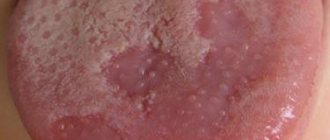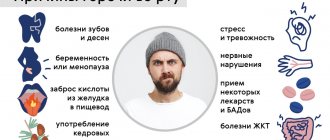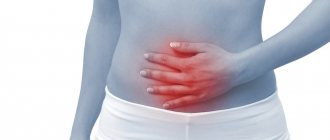Vomiting can happen in different ways
Nausea is not limited to pregnant women, as many may think at first glance. A similar condition is experienced by women in the absence of pregnancy, men, and children. In this case, unpleasant sensations may pass without a trace or be accompanied by fever, vomiting, and diarrhea.
Depending on the root cause, there are 4 types of nausea:
- reflex – typical in the presence of inflammation in the gastrointestinal tract (gastrointestinal tract), which irritates the receptors of the celiac and vagus nerves, which transmit a signal to the brain. It manifests itself with ulcers and gastritis in the form of bloating, tingling in the hypochondrium, and a feeling of heaviness after eating. There is also a psychogenic nature, when smells, objects and even associations act as an impulse to a bad state, which indicates the presence of neuroses;
- cerebral - makes itself felt after brain injuries or diseases occurring in it. Appears at any time of the day;
- toxic – occurs while taking medications or due to infectious intoxication. Toxic substances affect the vomiting center and trigger zones, which provokes lightheadedness;
- vestibular – the body’s reaction to changes in body position. It is observed during sudden rises from bed, during boat trips, car trips or rides on attractions.
It is typical during pregnancy and menopause, accompanied by tinnitus, darkening of the eyes and dizziness.
IMPORTANT! Most varieties are treatable; ignoring the phenomenon will only worsen it.
Causes
The causes of psychogenic vomiting lie in increased excitability of the brain. Vomiting is a peculiar reaction of the human body to a stressful situation. It is worth noting that nervous vomiting has a paroxysmal nature, its frequency and abundance depend on the specific case. The causes of psychogenic disorders of the gastrointestinal tract in adults are as follows:
- increased anxiety (for example, fear on the eve of some important event or event);
- reaction to a particular memory (this can be not only an event, but also a smell, taste, etc.);
- a peculiar response of the body to a stressful or conflict situation, the manifestation of emotions that the patient is trying to hide;
- uncontrollable psychogenic nausea during psychosis.
A distinctive feature of the disease is the occurrence of vomiting in the morning, before breakfast. As the disease worsens, nausea may become more frequent; for example, if we are talking about self-provoking vomiting in bulimia, the release of gastrointestinal contents will be spontaneous.
Causes
People suffering from frequent symptoms of illness wonder why they feel sick in the morning. If a one-time occurrence can be ignored, then regularity indicates abnormalities in the body.
Another mistake most people make is taking pills that eliminate the symptom, but do not have any effect on the root cause. Such “treatment” will not solve the problem, and frequent swallowing of tablets will aggravate the condition of the liver and pancreas. In general, all causes are divided into physiological and pathological.
Physiology
The most common factor in morning sickness is toxicosis in the first weeks of pregnancy. This is a consequence of increased estrogen production. When carrying twins, the gag reflex intensifies and is accompanied by abdominal pain and dizziness.
Vomiting in the morning goes away after 2-3 months (depending on the individual characteristics of the body), and the condition of the expectant mother returns to normal
If unpleasant symptoms do not subside before the 5th month and are pathological in color, which interferes with normal food intake, you should consult a doctor. When a girl is not pregnant, she may be haunted by other physiological reasons:
- binge eating;
- side effect or overdose of medications;
- unhealthy diet (abundance of fatty, spicy, smoked foods);
- smoking or drinking alcohol on an empty stomach;
- vegetative-vascular dystonia (disruption of communication between the sympathetic and parasympathetic parts of the nervous system leads to a decrease in blood pressure, hence nausea and vomiting in the morning).
These factors are equally evident in men, so representatives of both sexes should take their lifestyle more seriously.
Pathologies
A feeling of morning sickness and general malaise often indicates the initial stage of a disease of the internal organs. Regardless of gender, such symptoms are alarming if you have:
High blood pressure in the morning
- diseases of the gastrointestinal tract;
- cholecystitis, pancreatitis and other diseases of the digestive system;
- pathologies of the cardiovascular system;
- neurological disorders;
- diseases of the kidneys and urinary system;
- decreased thyroid function;
- oncology;
- infectious diseases;
- helminthiases.
Acute pathologies requiring immediate surgical intervention are also common. We are talking about appendicitis, acute pancreatitis, and intestinal obstruction. The diseases are accompanied by localized pain in the hypochondrium, iliac region or girdle discomfort.
"Male" causes of nausea
There is no clear division of factors into male and female, since the vast majority of diseases do not have a gender classification. Since the main female cause is considered to be pregnancy, the male cause includes drinking alcohol and smoking (at night or on an empty stomach). Due to intoxication, nausea, dizziness appear, and cases of vomiting syndrome are common. This also includes cardiovascular diseases, which often overtake men.
Due to the fact that men are more exposed to physical activity, cases of hypotension, arrhythmia, and decreased myocardial contractility predominate among the male population
In recent years, diseases have become “younger”: if previously this was a problem of the older generation, today even a young guy can suffer from heart disease. Lack of medical intervention leads to death.
Symptoms of psychogenic disorder
When the body encounters one or another emotional stress, the brain generates a signal to prepare the body for fight. If an adult has a nervous disorder, the reaction to the message may be erroneous.
Symptoms in adults during an exacerbation of the disease are as follows:
- increased sweating due to increased work of the sweat glands;
- total weakness, apathetic state, lack of physical strength;
- increased heart rate;
- irritability;
- lowering blood pressure, etc.
At the same time, the nervous system reacts inadequately to seemingly familiar things and ordinary situations, which in a healthy state of the body do not cause irritation.
It is noteworthy that upon completion of the stressful situation, the person completely returns to normal, psychogenic nausea recedes, in some cases being replaced by an increased feeling of hunger.
Nausea in children
Children are no less susceptible to nausea than adults, and the symptom can be observed both before school and during classes. The reasons are often painful:
- CNS disorders (intracranial pressure, meningitis, epilepsy, hydrocephalus);
- gastrointestinal diseases (gastritis, colitis, appendicitis);
- pathologies of the endocrine system (including against the background of elevated sugar levels);
- poisoning (food, toxic, drug);
- worms.
In addition to nausea, there are accompanying symptoms that indicate the need for medical attention:
- elevated temperature;
- diarrhea, vomiting;
- blood impurities in urine, feces, vomit;
- cutting pain in the abdomen;
- respiratory arrest, severe headache, pale or bluish skin.
Children are often diagnosed with appendicitis, the primary manifestations of which are stool upset, impulsive pain in the navel or right side, dry mucous membranes and vomiting with bile. In the early stages, the appendix is successfully operated on; delaying treatment can result in peritonitis and death.
If nausea is observed in a child rarely and without additional complications, this may be a consequence of overwork, stress, or poor nutrition. Vomiting after sleep occurs due to the inability of the child's stomach to digest the fatty and heavy food that the baby ate the day before. Minimal consumption of light meals on the first day and an established diet will correct this problem in the future.
Going to school on an empty stomach is not the best option for a growing body. To avoid dizziness and fainting, a nutritious breakfast (cereal porridge with fruit) and a mandatory lunch are required. But what to do if the child is still small, and vomiting occurs unexpectedly?
In this case, you need to provide first aid:
- lay the child on his side (so that, lying on his back, he does not choke on vomit);
- to avoid dehydration, give mint tea, chamomile or rosehip infusion;
- reduce fever with antipyretics;
- give rehydration solution and antiemetic drug;
- wait for the doctor to arrive.
Why does vomiting with bile occur?
Bile in vomit is another unpleasant sign of gallstone disease or inflammation of the gallbladder. Repetitions of the gag reflex occur every 2 hours, without bringing relief to the patient.
Morning vomiting with yellowing and itching of the skin indicates cholecystitis
Pancreatitis occurs with aching abdominal pain on the right, but lying down reduces the intensity of the pain. High body temperature, bloating, yellowing of the white membrane of the eyes are accompanying symptoms of liver disease, intestinal obstruction, and bile ducts.
Taking large amounts of alcohol and low-quality foods irritates the gastric mucosa and leads to vomiting. This is how the protective function of the body manifests itself, trying to fence itself off from incoming toxic substances. If over time it is accompanied by the release of bile, this indicates the development of serious problems with the gastrointestinal tract.
ATTENTION! Vomiting mixed with bile also occurs in the first trimester of pregnancy. The process is due to two reasons: hormonal changes in the body and exacerbation of chronic diseases (cholecystitis, duodenitis, pancreatitis).
Diagnostics
To find out the causes of vomiting in the morning and establish an accurate diagnosis, you should consult a physician or gastroenterologist. This is especially true for people who often feel dizzy and are susceptible to:
- drowsiness;
- bowel dysfunction;
- pain when urinating;
- high temperature, which is difficult to bring down with medications;
- malaise, faintness;
- heartburn;
- rapid weight loss and lack of appetite.
After the initial survey, the therapist prescribes a urine and stool test for hidden bleeding, computed tomography, endoscopic examination of the stomach, and ultrasound of the abdominal organs. If morning sickness is caused by other reasons, treatment is carried out by a highly specialized doctor (oncologist, endocrinologist, parasitologist, etc.).
Treatment
When nausea is caused by inflammation of the appendix, surgical intervention is necessary. In any case, nausea is not a disease, but only a manifestation of the disease. It is possible to find out exactly what needs to be treated only after a thorough examination. At first, to relieve unpleasant symptoms, the doctor prescribes antiemetic drugs, and then begins the main treatment.
Medicines
You can get rid of morning sickness on an empty stomach with the help of Diazepam, Seduxen, Prazepam. You can take pills not only to eliminate, but also to prevent gag reflexes. Doctors recommend these medications during seasickness and air sickness.
The drugs suppress nausea and improve the condition, but in the absence of comprehensive treatment, such therapy gives a short-term effect. Many medications should not be used by children or pregnant women. Therefore, the prescription of drugs, dosage and course of treatment are prescribed only by the attending physician.
Treatment is carried out using dopamine receptor blockers (Cerucal), antipsychotics (Etaperazine, Aminazine), sorbents (activated carbon, Polysorb). For stomach ulcers, antibiotics and antisecretory tablets (Ampicillin, Pariet, Pilobact Neo) are prescribed. Ranitidine and Kvamatel are prescribed as prophylaxis.
ethnoscience
Once the causes of morning nausea in women and men have been determined and drug treatment has been prescribed, it can be supplemented with folk remedies. They will relieve nausea and replace antiemetic medications. If you feel nauseous in the morning, the symptom will be removed:
- decoction of ginger root (1 tsp of dry plant, pour 250 ml of boiling water, leave for 30-40 minutes);
- lemon poured with boiling water is a universal remedy that is safe for patients with any diagnosis (including children and pregnant women);
- a decoction of dry or fresh lemon balm leaves (prepared in a similar way to ginger decoction).
Pregnant women and children are recommended to consume fresh juices daily on an empty stomach - they not only fight nausea, but also saturate the body with vitamins
To stop vomiting after eating:
- edible mint oil applied to the gums and nasal mucosa;
- red currant juice;
- dill tea;
- potato juice (1 tbsp);
- apple infusion with honey;
- peeled burdock rhizomes (3-4 pieces eaten per day are enough);
- sauerkraut brine (3 tbsp on an empty stomach will normalize digestion and restore intestinal microflora).
IMPORTANT! When vomiting, you need to drink as much water, green or black tea as possible.
Treatment options
When talking about the treatment of psychogenic overeating and psychogenic vomiting, it is important to take an integrated approach. The fact is that a long-term disease negatively affects the nature of metabolism in the body of an adult - the extracellular fluid volume is reduced, alkalosis, hypokalemia, nocturia and other life-threatening conditions often develop. Therefore, it is extremely important to approach your treatment program responsibly. To treat psychogenic vomiting, the following is used:
- drug therapy;
- psychotherapy, the purpose of which is to combat obsessive thoughts, reduce anxiety and dull the feeling of nausea;
- diet therapy - the menu is designed in such a way that the patient receives all the necessary nutrients with sufficient calories;
- developing healthy eating habits;
- weight gain under the supervision of a nutritionist and trainer;
- treatment of associated complications.
Preventive measures
Those who experience morning sickness frequently should review their diet by eliminating foods that are difficult to digest. It is especially worth giving up the bad habit of eating such dishes before bed. Alcohol and smoking poison the body, which fights toxic elements through rejection (i.e. vomiting), so addictions also have no place in life.
And so that nausea and headaches no longer bother you, both men and women should follow simple recommendations:
- eat often, but in small portions;
- have foods in the refrigerator that prevent nausea (citrus fruits, sour apples, juices);
- drink at least 2 liters of water per day;
- regularly ventilate the room;
- mint candies will help overcome nausea outside the home;
- sometimes nausea is caused by hunger: in such cases, having breakfast is enough;
- periodically do “fasting” days;
- moderate physical activity will tone the body and normalize metabolic processes;
- If you experience frequent symptoms of nausea, consult a doctor.
Morning sickness may indicate serious pathologies, therefore, if this problem often bothers you and is accompanied by additional symptoms that worsen your general condition, you should immediately see a doctor.
Do not self-medicate under any circumstances (this especially applies to children and pregnant women). Depending on the age, nature and course of the disease, the doctor will select an individual treatment plan aimed at combating not only the symptoms, but also the causes of the disease.
Little secrets for all patients with a gag reflex
At the doctor’s appointment and at home:
- If you know you are prone to a gag reflex, do not eat anything 2-3 hours before your dental appointment.
- Make an appointment for the afternoon. It was noted that in the morning the sensitivity of the reflex was increased.
- The ability to breathe fully through your nose will greatly reduce the likelihood of a reflex. Use drops or solutions to rinse before use if necessary.
- Breathe! Breathe! Breathe! At the slightest approach of the reflex, rhythmically inhale through your nose and exhale through your mouth. Just as it is impossible to breathe and swallow at the same time, the gag reflex does not occur simultaneously with breathing.
- Try humming or humming sounds, this will create a continuous flow of air and prevent the reflex.
- Retrain the reflex: methodically, day after day, train placing objects (a toothbrush, a teaspoon) in your mouth deeper and deeper. Press them against the palate in the area of the front teeth, gradually moving to the distant areas. On average, two weeks are enough to reduce or completely get rid of the reflex.
- Retraining or an appointment with a doctor will be easier if you actively distract yourself during the procedure: listen to music, watch TV, take ice in your hands, clench your fist tightly (twist the fig quietly), let your attention switch from one problem area to another. Some people find it helpful to sprinkle a few grains of salt on their tongue before the procedure. Or rinse your mouth with salted water. We need to try all the options!
- Learn to relax. Talk to the doctor. Find out all the issues that may bother you or cause anxiety. Tell us about your previous treatment experience, when the reflex appeared, and what causes it. A trusting relationship and an understanding of what is happening will help you feel comfortable and the doctor to avoid procedures that are unpleasant for you.









